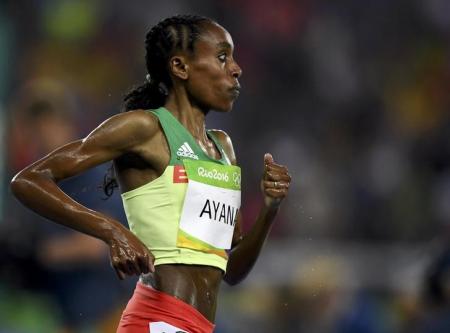
By Mitch Phillips
LONDON (Reuters) – Almaz Ayana will sign off her stellar 2016 season in Brussels on Friday by trying to add the 5,000 metres world record to the incredible 10,000 mark she set at the Rio Olympic Games last month.
World 5,000m champion Ayana, among more than 40 Rio medallists competing in the final Diamond League meeting of the year, has every chance of eclipsing the record of 14 minutes 11.15 seconds set by fellow Ethiopian Tirunesh Dibaba in Oslo eight years ago.
Ayana came close to that mark when clocking 14:12.59 in Rome in June but moved into a new stratosphere with her extraordinary exploits in the 25-lap event in Rio.
On the opening morning of the athletics programme, she produced an astounding run to clock 29:17.45 and take 14 seconds off the 23-year-old 10,000 metres record, set by China’s Wang Junxia in Beijing.
To give some context to that performance, no woman had broken 30 minutes in the previous seven years and Wang’s time was also 22 seconds faster than anything that had gone before.
Wang’s effort was also considered dubious amid reports that she had signed a letter admitting her performances were aided by doping.
Ayana too faced doping questions immediately after her run, with Sweden’s Sarah Lahti, who also smashed her personal best in the race, saying she did not believe her rival was “100 percent”.
The 24-year-old Ayana, who had run the 10,000m only once previously, has never failed a drugs test and, through an interpreter, responded to the interrogation by saying: “My doping is training, my doping is Jesus”.
In the wake of Ayana’s performance, a group of statisticians tried to place it in historical context and, through a complex comparison system, concluded that it ranked as the fifth-best women’s track performance of all-time.
Britain’s Athletics Weekly magazine published the results last week after the statisticians used “extreme value theory” to rank performances against those of their contemporaries.
Number one in the women’s list was Florence Griffith-Joyner’s still-unchallenged 100m world record of 10.49 seconds at the 1988 U.S. Olympic trials in Indianapolis, now considered by many to have been wind-assisted and set by an athlete who faced widespread accusations of doping.
The American’s 200m mark from the same year set at the Seoul Olympics comes in at number seven on the list while Wang’s 10,000m record is one place behind Ayana in sixth.
In a list featuring records also widely regarded to have been chemically-enhanced, the only other performance from this century to make the top 10 was Ethiopian Genzebe Dibaba’s 1500m world mark set last year.
On the men’s side, Lee Evans’s 400m at the Mexico Olympics was the surprise number one, ahead of Ron Clarke’s 10,000m in 1965.
Usain Bolt’s 19.19-second 200m at the 2009 Berlin world championships was number three with the Jamaican’s 9.58 100m from the same event in at number eight.
At number nine is Briton Sebastian Coe, the current president of the International Association of Athletics Federations (IAAF), whose 800m record set in 1981 stood for 16 years.
(Editing by Ian Chadband)
Hackdra is a cyber security company that can provide smart contract auditing, pen-testing, bug bounty, blockchain, web3, DeFi, NFT, and ARM services with AI.